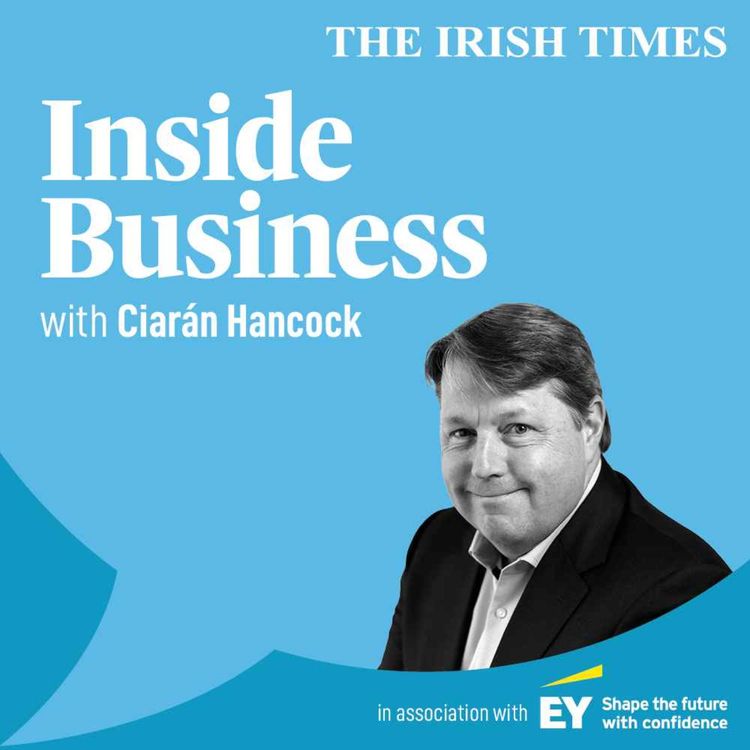Share

Inside Business with Ciaran Hancock
Is a Ryanair-style model the answer to Ireland’s housing crisis?
This week’s episode looks at the housing crisis from a slightly quirky angle.
Imagine if Michael O’Leary decided to set up a development company to build housing and applied some of the lessons from Ryanair’s experience in disrupting the air travel business over the past three decades.
It’s a point that Irish Times economics correspondent Eoin Burke Kennedy posited in a column earlier this week. Could a no-frills approach reduce construction costs that could in turn be passed on to home buyers?
Paul Mitchell, director of construction consultancy Mitchell McDermott and an expert on construction costs, also joins the podcast to give his thoughts on potential solutions to ease the housing crisis in the coming years. Mitchell McDermott recently produced a cost study report on behalf of the Department of Housing, contained in which is the eye-watering figure of €600,000 now necessary to build a two-bedroom urban apartment.
Produced by John Casey with JJ Vernon on sound.
More episodes
View all episodes

Could Simon Harris’s savings scheme for the ‘middle classes’ prove to be a sound investment?
38:27|Tánaiste and Minister for Finance Simon Harris announced a plan this week to introduce a new savings scheme to unlock the €170 billion that people here are keeping in mostly low-yield bank deposit accounts.His plan is to devise a scheme that generates good returns for savers in a way that puts the money on deposit to better use in the economy.Cliff Taylor of The Irish Times covered the story this week, he joins host Ciarán Hancock in studio to assess how such a scheme might work and what might be on the table come budget time.In the second half of this episode, we discuss how visitor numbers to Ireland were down last year, the weather in 2026 has been lousy so far and the country has been getting a reputation as a high-cost location for a holiday.On the flip side of the coin, the Government has decided to scrap the passenger cap at Dublin Airport and has eased rules that would have banned short term holiday lets in rural locations.Eoghan O’Mara Walsh is chief executive of the Irish Tourism Industry Confederation and joined Ciarán on the line to discuss the issues facing the tourism industry this year and its likely asks of Government in the next budget.And with St Patrick’s Day on the horizon and it being the typical starting point of the Irish tourism season, how is the year ahead shaping up for the industry?Produced by John Casey with JJ Vernon on sound.
David McWilliams on how social media giants are making billions from fake ads
32:09|First up on this week’s episode of Inside Business, we look at new research this week from Revolut suggests that social media companies made €32 million in revenue from scam ads to Irish users in 2025. The figure for Europe as a whole was a whopping €4.4 billion.Host Ciarán Hancock is joined by Irish Times reporter Hugh Dooley to takes us through the headline findings from the Revolut research, while Irish Times columnist and economist David McWilliams discusses how his image was used by scammers last year to con people out of money.Also, research this week from the ESRI suggests the property industry is using ghost bids and other tactics to create a frenzy and nudge buyers into increasing their bids for properties here.It found participants’ bids were pushed higher in open auctions managed by estate agents or online platforms than in sealed bid auctions.Owen Reilly is a leading estate agent in Dublin, and he discusses how the research chimed with his own experience in the industry.Produced by John Casey with JJ Vernon on sound.
Is it time Ireland abolished mandatory retirement?
31:16|On this week’s episode of Inside Business, we hear the argument for scrapping mandatory retirement here.Host Cliff Taylor is joined on the line by Irish Times contributor John Fitzgerald who thinks Ireland should follow the lead of Scandinavia, the Baltics and the Netherlands, where three-quarters of the population aged 60-64 are in the labour force. He makes the case that such a move could not only reduce the numbers on the State pension, ease the cost of ageing to the exchequer, but also help alleviate the housing crisis.Also on this episode, we look at the German economy, which is frequently referred to as the Engine of Europe, but has begun to sputter quite a bit in recent times.A lack of much-needed reform, low levels of foreign investment and ineffective fiscal stimulus measures are just some of the reasons the German Chancellor Freidrich Merz is under increasing pressure to revive the economy, and quickly.But what needs to be done before that revival can start? And is there any cause for positivity in the economic outlook for Germany this year? Irish Times Berlin correspondent Derek Scally offers some insights.Produced by John Casey with JJ Vernon on sound.
With the price of an ounce now more than $5,000, why is everyone going for gold?
47:11|This week on Inside Business, host Ciarán Hancock is joined in studio by Cliff Taylor to talk about the recent surge in the price of gold, which went past $5,000 an ounce on Monday, setting a new high. In January alone, the price has climbed by 17 per cent.So, who’s buying it? Why is it viewed as a safe investment? And what role has US president Donald Trump played in this price spike?Cliff has been following the story and explains the reasons behind the price surge. The EY Entrepreneur of the Year programme has been running since 1998, with Denis O’Brien chosen as the first winner. Each year 24 finalists are chosen for a months-long programme of events, culminating in awards night and the announcement of the category and overall winners. Last year, Edward McCloskey of WaterWipes fame took home the overall prize. Roger Wallace is the EY partner in charge of the programme while 2025 finalist James Kelly is a managing director with LMH Engineering in Arklow, Co Wicklow. They joined Ciarán in studio for a chat on the benefits of the awards programme, what it takes to be an entrepreneur and the current state of Irish entrepreneurship.Produced by John Casey with JJ Vernon on sound.
Old order ‘not coming back’ as Trump overshadows World Economic Forum
12:54|As the annual World Economic Forum enters its third day, host Ciarán Hancock is joined from Davos in the Swiss Alps by Irish Times Economics Correspondent Eoin Burke-Kennedy.US President Donald Trump’s push to take over Greenland, and the strain it is putting on EU-US relations, has dominated this year’s event so far. Trump is due to arrive in Davos on Wednesday afternoon.On Tuesday, French president Emmanuel Macron openly accused the US of trying to “subordinate” Europe and referred to the consequences that could arise from this “new colonial approach”.Also on Tuesday, Canadian prime minister Mark Carney was damning in his assessment of Donald Trump’s impact on global politics and a “fading” rules-based order. He also warned countries against a policy of appeasement when it comes to major powers like the US.Speaking in Davos, Minister for Enterprise Peter Burke echoed the concerns of many there, he told those in attendance that US strategy on Greenland, and the threat of tariffs to countries opposing the move, was effectively “tearing apart” the EU-US trade deal.Produced by John Casey with JJ Vernon on sound.
Trump vs the Fed: What does it mean for global trade and Ireland?
23:47|On this week’s episode, host Ciarán Hancock is joined in studio by the Irish Times economics experts Cliff Taylor and Eoin Burke-Kennedy.Tensions are rising between US President Donald Trump and the Federal Reserve. Trump has made it very clear that he is no fan of Fed chief Jerome Powell who is due to step down from his post in May, and that he wants the Fed to be more aggressive with interest rate cuts to stimulate the economy.Those tensions ratcheted up considerably when the US Department of Justice opened an investigation into Powell, and his handling of a $2.5 billion renovation of the central bank’s headquarters.Powell has publicly pushed back and warned the independence of the Fed is at stake, and senior central bank figures from around the world have also expressed their support for Powell. Cliff and Eoin also look at Ireland’s decision to vote against the Mercosur trade deal at EU level, it is still going to go through of course, but voting against it has led to charges of hypocrisy given all the talk from Government about Ireland being a small open economy that relies on the free movement of trade and services.Produced by John Casey with JJ Vernon on sound.
Ireland’s record tax take makes light of Trump tariffs fear
49:42|2025 proved to be a record year for tax receipt figures, with the total hitting €106bn.This was despite extensive warnings about the State’s precarious position due to Donald Trump’s series of tariffs, and the number of big multinationals that use Ireland as an export base.It was another bumper year for corporation tax receipts as they exceeded expectations, but perhaps the non-corporation tax take offers the clearest insight into how Ireland’s economic growth will progress as we start 2026.For analysis of the numbers, host Cliff Taylor is joined in studio by chief economist at Davy, Kevin Timoney.Also on this week’s Inside Business, we look at how new EV sales increased last year to overtake diesel, a massive turnaround from 2023 and 2024, which saw EV sales plummet.Will this trend continue? Can charging infrastructure start to meet demand? And what’s being done to increase road safety? Irish Times Motoring Editor Michael McAleer gives his take on the trends hitting Irish roads in 2026.Produced by John Casey with JJ Vernon on sound.
Another huge corporate tax take to AI’s next phase: What’s in store for 2026?
44:48|For this week’s episode, host Ciarán Hancock Is joined by an expert panel to look forward to 2026. After another record-breaking year for corporate tax receipts, is there now a real threat of concentration risk in the Irish economy?A huge amount of money has been raised and spent on AI, but where is it at in terms of its development? When will investors start looking for a tangible return?And will Donald Trump turn his attention back to economic matters after moves to end the conflicts in Gaza and Ukraine? Could more tariffs be on the way in 2026?The panel comprises CEO of the Sherry Fitzgerald Group, Marian Finnegan, tech entrepreneur and columnist at the Irish Times, Chris Horn, and Irish Times Economics Correspondent, Eoin Burke-Kennedy.Produced by John Casey with JJ Vernon on sound.
Trump’s tariffs, a deepening housing crisis, and more corporate tax bonanza: The big stories of 2025
44:18|For this episode of Inside Business, host Ciarán Hancock is joined by a panel of experts to discuss the major stories of 2025.A busy year in markets was dominated by US president Donald Trump’s threats to impose huge tariffs on the United States’ trading partners, including Ireland.Ireland’s housing crisis showed no sign of improvement with completions trending well below Government targets.And another record-breaking year for corporate tax receipts, coupled with Ireland's gross domestic product (GDP) growing exceptionally by over 10%, meant that the economy is in rude health as we head into 2026.The panel comprises Aidan Donnelly, Head of Global Equities at Davy, Susan Hayes Culleton, Managing Director, HayesCulleton Group, and Cliff Taylor of the Irish Times.Produced by John Casey with JJ Vernon on sound.